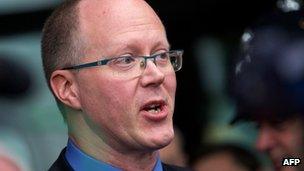Entwistle urged to consider giving up half of severance pay
- Published

George Entwistle resigned just 54 days into the job
Former BBC boss George Entwistle should consider giving up half of the £450,000 severance payment he is getting, deputy Labour leader Harriet Harman has said.
The payment was described as "over-the-top" and "outrageous" by MPs as Parliament debated the fallout from the ex-director general's resignation.
Culture Secretary Maria Miller said it was a matter for the BBC Trust but "reward for failure" was inappropriate.
BBC chairman Lord Patten has insisted the payment was "justified".
Mr Entwistle resigned on Saturday, after a Newsnight report led to former Tory treasurer Lord McAlpine being wrongly accused of child abuse.
He had been in the job for just 54 days. Under the terms of his contract, Mr Entwistle had been entitled to six months' pay on quitting Lord Patten said the pay-off had been agreed "to conclude matters quickly".
In response to an urgent question from Labour, Mrs Miller said pay and other financial arrangements were a matter for the BBC Trust but said the sum was "hard to justify".
'Over the top'
She said it was for Mr Entwistle to decide whether it was appropriate for him to take the full amount, adding that the National Audit Office could examine whether the compensation package was value for money.
MPs from all parties criticised the pay-off, Conservative John Redwood saying it was "outrageous and over-the-top" and fellow Tory Rob Wilson suggesting that Mr Entwistle had been paid "to go quietly".
Labour's Paul Farrelly said the payments made it "difficult for friends of the BBC to stand up for it".
However, other MPs praised the breadth and quality of BBC journalism and urged the new acting director general to be given space to bring stability to the organisation in the wake of its recent difficulties.
Downing Street sources said David Cameron believed it was a matter for Mr Entwistle's "conscience" whether to accept.
But in a letter to Conservative MP John Whittingdale, chairman of the Commons Culture, Media and Sport Committee, Lord Patten argued the amount was "justified and necessary".
Lord Patten said Mr Entwistle would have been entitled to a year's pay if he had been sacked, adding that the a "consensual resignation on these terms was clearly the better route".
Asked whether the pay-off further undermined trust in the BBC, acting director general Tim Davie said it was not his decision and was a "matter for the BBC Trust".
The BBC Trust said the size of the pay-off, the equivalent of a year's salary, reflected the fact that Mr Entwistle would continue to help on BBC business, most specifically two ongoing inquiries related to the Jimmy Savile abuse allegations.
He quit on Saturday after criticism of his leadership of the BBC in the wake of a Newsnight film in which a victim of alleged abuse at a children's home in Wales in the 1970s accused an unnamed former senior Conservative politician of involvement.
Speculation on the internet and Twitter linking Lord McAlpine to the case led him to issue a public statement saying such claims were "wholly false and seriously defamatory" and it emerged on Friday that he had been wrongly identified and implicated.
Patten's letter to Whittingdale
Credit: DocumentCloud
Mr Whittingdale said a lot of people would be "surprised" at the size of Mr Entwistle's pay-off.
"I wouldn't have thought that just because you have to help any inquiry into the Savile allegations you necessarily need to be paid such a large amount of money," he said.
The BBC's political editor Nick Robinson said that, on Monday, both PM David Cameron, who met members of the public in Bristol, and Labour leader Ed Miliband, who did a number of regional TV interviews, had chosen to say "not a single word" about the BBC.
The reason was that both government and opposition were determined to preserve the independence of the BBC, he added.
He said that while, in theory, ministers could dismiss Lord Patten and his fellow trustees, that was not going to happen.
Media commentator Steve Hewlett said the former BBC boss was entitled to compensation for losing his job, since he had "not done anything wrong in the moral or ethical sense".
"The point is he was the wrong guy for the wrong job at this time and one has every sympathy for him.
"So I think this is the Trust in effect saying that they bear some responsibility for appointing him, because what does this mean for his career, where's he going to work now?"
And Steven Barnett, professor of communications at the University of Westminster, said the BBC should be left to get on with the task of reviewing what had happened and that it was "not helpful" for Downing Street to question the size of Mr Entwistle's payment.